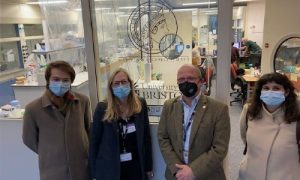Representatives from the French Embassy visited University labs on 10 December to see some of the innovative COVID-19 research being undertaken at Bristol, including work on ADDomer™, a thermostable vaccine platform being developed by Bristol scientists to combat emerging infectious diseases.
Dr Rachel Millet and Arthur Belaud from the Embassy’s Innovation Branch, which seeks to drive France-UK business enterprise, met with scientists Professor Imre Berger and Frederic Garzoni, founders of Imophoron Ltd, the biotech start-up developing ADDomer that uses technology developed at an institution in France, and recently secured £4 million investment.

During the visit, the delegation took a tour of labs in the University’s Max Planck-Bristol Centre for Minimal Biology (MPBC), the GW4/Wellcome Trust Cryo-EM facility led by Prof Christiane Schaffitzel, and Science Creates, the Bristol-based incubator, which is operated in partnership with the University and supports scientists and engineers in commercialising ground-breaking innovations. Having recently opened its second facility in the city’s Old Market, the party met with Science Creates founder and Bristol graduate Dr Harry Destecroix to discuss the future of deep-tech eco-systems.
Professor Imre Berger, Director of Bristol’s Max Planck Centre for Minimal Biology, said: “We are honoured to host this visit from the French Embassy’s Innovation Branch to share knowledge and showcase the pioneering research that is being done in collaboration with our European colleagues and institutions.”
Press release issued: 10 December 2021 on University of Bristol News and Features~ article here.

